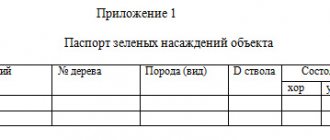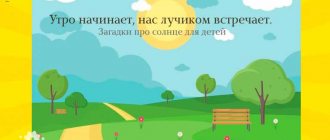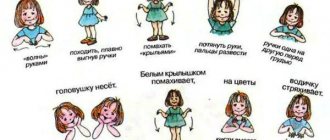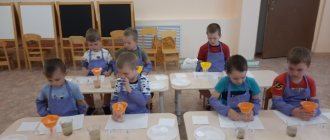Recommendations for educators “Organization of morning reception of children in preschool educational institutions”
Recommendations for educators
“Organization of morning reception of children at preschool educational institutions”
Prepared by E.Z. Fomina,
Deputy Director for subsidiaries
Morning reception -
This is part of the daily routine, held at a certain time, in a certain specially equipped place, when children and adults gather to exchange information, discuss problems, jointly plan and organize their further activities during the day.
Goals and objectives of the morning reception:
- the formation of friendly relationships between children, the creation of an atmosphere of support and cooperation between children and adults, a general positive emotional background, and a feeling of psychological comfort;
- exchange of information about past or upcoming events, children's interests;
- solving some educational problems (expanding children's ideas, developing speech, logical thinking, etc.);
- formation of motivation for upcoming activities;
- providing information about materials in activity centers for the current day and planning activities in activity centers;
- making a choice of activities based on one’s own interests and needs.
For preschoolers
- this is, first of all, an opportunity to spend a few minutes together, which is important for shy children, to tell what you think and feel.
Morning reception for teachers
makes it possible to create an atmosphere of collective creativity, which helps to develop in students a sense of mutual respect and kindness. Consequently, one of the main requirements for a teacher’s professional skills is the ability to manage children’s interpersonal communication, resolve conflict situations, and organize creative joint activities.
The main stages of the morning reception:
- greetings;
- information exchange;
- group activities;
- daily news.
The morning reception begins with a greeting.
A wide variety of forms are used:
Paying attention to the stand
“Hello, I’ve arrived,” “Birthday Boy’s Corner,” “Star of the Day,” “My Mood.”
Also poetic
, song greetings; We greet with palms, shoulders, give various wishes, compliments, in general, games that create an emotional - positive mood for the whole day.
Exchange of information - second stage
morning reception, the main theme is “Good Deeds”.
Children strive to share everything that fills their soul, that begs to be spoken - home events ,
successes and failures, childhood grievances and achievements. Children tell what the most interesting events happened in their lives. So, for example, one of the students said what a good deed he and his dad did for the birds in winter: they made feeders and hung them in the park. Then the teacher organizes a discussion. Children take part in it, i.e. ask questions and comment on what they hear. Thus, children learn the rules of conducting verbal dialogue, the ability to express their feelings; vocabulary is enriched and activated. Children develop emotional responsiveness, goodwill, and confidence that they are loved and accepted for who they are. News is accepted as fact. And if time is limited, we use some tricks, for example: today only boys, or those whose names begin with vowels, share the news. And, of course, we invite the children to decide for themselves who will talk about the news today.
The next stage of morning greeting is a group activity..
The following games are played at this stage:
finger games (“House”, “Cat and Mouse”, “Thunderstorm”);
word games (“We won’t tell you where we were, but we’ll show you what we did”, “Find the rhyme”, “Finish the sentence”);
fantasy games (“Creative Mistake”, “Bringing Objects to Life”, “Constructing a Riddle”);
chain games, etc. At the same time, a soft toy is passed from hand to hand, and each child has the opportunity to take part in the game. Everything that helps children feel comfortable, easy and fun.
Daily News - Stage Four
morning reception - sets children up for active communication with each other, both verbal and non-verbal. During this stage, the teacher informs the students the following information:
- about calendar events (season, date, day of the week, weather changes;
- a special event - the birthday of one (or several) of the pupils;
- about the activity plan for the current day - children’s choice of activity centers. A presentation of the centers is made, the children are told what interesting materials await them, they are asked to think and decide which center they will go to and what they will do today.
Sometimes, during classes at activity centers, behavioral problems arise, and then at the morning reception it becomes necessary to involve children in developing certain rules that provide a way to implement them.
The participation of children in the development of rules allows them to further exercise self-control over their behavior, and also forces them to demand that other children follow the rules.
Thus, morning reception is one of the ways to organize free communication and develop the speech of pupils. During the morning reception, preschoolers learn the rules of verbal dialogue, the ability to express their feelings, their vocabulary is enriched and activated.
Children develop emotional responsiveness, goodwill, tolerance, form moral ideas and concepts for analyzing norms and rules of behavior, and become confident that they are loved and accepted for who they are. Thanks to a creative approach to organizing this component of the regime of stay in a preschool educational institution, children develop a positive attitude for the whole day, which has a beneficial effect on the educational process as a whole.
Bibliography:
- Bondarenko A.K. "Verbal games in kindergarten." A manual for children's educators. garden Ed. 2nd, rev. and additional M., "Enlightenment", 2007.
Planning the morning time slot at the preschool educational institution
Recommendations for teachers on planning the morning period of time in preschool educational institutions.
It is necessary to remember that the morning is a calm, routine moment.
The main task of pedagogical work in the morning is to include children in the general rhythm of life of the kindergarten, to create in them a cheerful, cheerful mood. It is very important to do emotionally stimulating gymnastics here. Work is carried out in subgroups and individually. If we talk about frontal work, it can be round dances and quiet activities. Morning reception is the most favorable time for individual communication between the teacher and each child. During these hours, individual work with children on various types of activities is successfully carried out. Its distinctive feature is ease, reliance on the child’s interest and curiosity, on the entertaining form and content of the activities. This is work on correcting and educating children in correct sound pronunciation, on developing oral speech and developing correct intonation, on physical education (stimulating motor activity). When planning individual work with children, the teacher specifically indicates the names of those pupils with whom the work will be done and prescribes what kind of work. In terms of content, the morning period of time includes: • play activities, • conversations with children, • examination of objects and illustrations, • short observations in nature and phenomena of social life. It is good to plan short conversations in the morning with a group of children or individual children on pre-planned topics and topics that arose on the initiative of the children. So, in the calendar plans of the junior and middle groups, the teacher schedules short conversations with children about close people and accessible objects and phenomena of the world around them: about mom, dad and grandmother, about younger brothers and sisters, about toys, books, natural objects and much more. Often such conversations are accompanied by viewing illustrations. In the calendar plans of the senior group, in addition to those indicated above, conversations are planned with and without looking at illustrations on more complex topics: about the seasons, about domestic and wild animals, about the life of their hometown. When planning specific activities, it is important to take into account the nature of the immediate educational activity ahead. If the GCD is of a calm nature, requiring mental activity and perseverance of children, such as, for example, GCD for the formation of elementary mathematical concepts, speech development (learning a poem, retelling), children’s activities are planned for the morning, causing their physical activity, and, vice versa, if GCD presupposes greater mobility for children (physical development, musical development), then morning activities should be calmer. Number of types of activities in the morning: • in the junior and middle - 3-4 types, • in the senior preparatory group - 4-6 types, depending on the children of the group. The teacher himself determines how many types of activities there should be based on approximate canons. Planning of educational activities in the morning period of time Date:_________________________________________________________________________ Educator:___________________________________________ Time Task Activity What we indicate in the plan What is accomplished Morning period of time Include children in the general rhythm of life of the kindergarten create a cheerful, cheerful mood teaching children to plan design activities creating conditions for meaningful individual selective activities in accordance with their interests individual communication between teachers and each child individual work on various types of activities work on correcting incorrect sound pronunciation on speech development development of correct intonation on physical education play activities conversations with a subgroup of children at the initiative of an adult conversations on a topic proposed or chosen by the child (by children) examination of illustrations observation in nature observation of phenomena of social life work activity examination of folk toys, embroidery, dishes, etc. visual activities at the request of children work on developing cultural and hygienic skills - names of children, with whom we will work - in what section of the program - type, form and name of work - topic of conversation - questions - daily work (duty) not every day, if a new type of duty is introduced - complication of work - change in working conditions - conditions for the development of the game - management techniques for gaming activities - attributes and equipment for games with a group or subgroup of children - the name of the games - techniques for arousing interest in outdoor games - what is being observed, for what purpose - what type of work - how responsibilities in work are distributed - conditions for independent activity - type of entertainment - who participates - motivating children for activity - types of games : - type of game, plot-based, board-printed, didactic - conditions created by the teacher - management techniques Recommendations _________________________ This material will help the teacher plan work in the morning, do self-analysis, as well as the senior teacher to carry out thematic control on this problem
We recommend watching:
Long-term work plan for fine arts and the development of creative abilities in the middle group Long-term work plan for fine arts and the development of creative abilities in the senior group Long-term planning for modeling from salt dough for children of the preparatory group Thematic planning in the senior group. Traffic rules circle
Similar articles:
Perspective-thematic planning in kindergarten
Long-term plan for oral folk art in the senior, preparatory group





